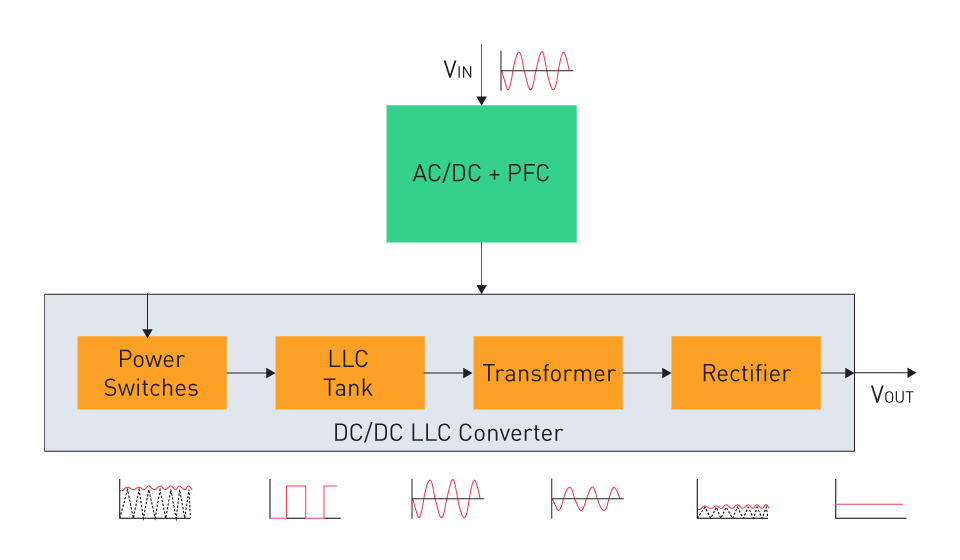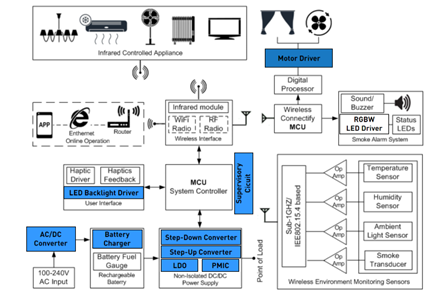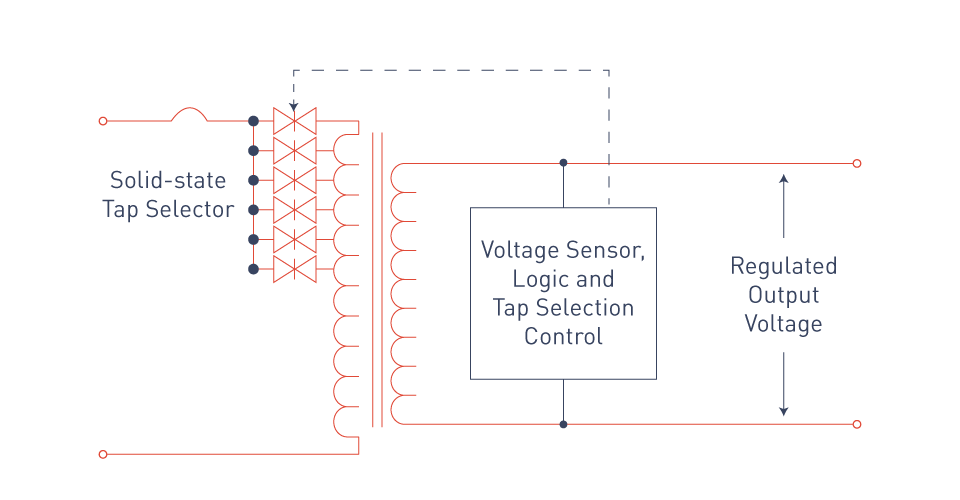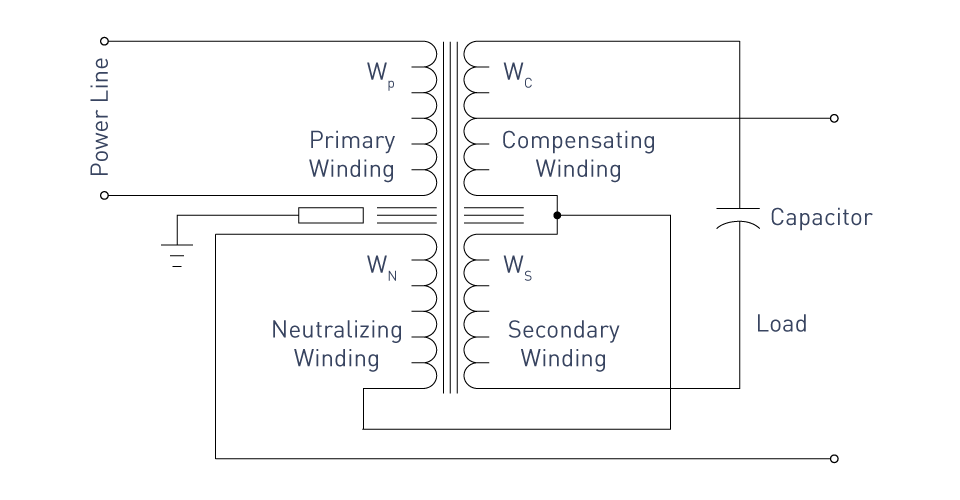Server Power Supplies
Importance in Ensuring Reliable Server Operations
The importance of LLC converters in server power supply cannot be overstated because of the direct impact they have on the dependability and effectiveness of server operations. Because servers are the backbone of data centers and information technology infrastructure, they require a robust and uninterrupted power source in order to function continuously.

Figure 1: Power Supply Block Diagram
Through the provision of voltage conversion that is both efficient and reliable, LLC converters make a substantial contribution to the dependability of server power supplies when used. Maintaining the integrity of the data and ensuring that servers perform under optimal settings, especially when subjected to varying loads and fluctuating input power conditions, are both extremely important.
Additionally, the high efficiency of LLC converters aids in reducing the heat production within the power supply units. The significance of this component lies in the fact that high heat can result in hardware breakdowns, which in turn reduces servers' dependability. Therefore, efficient power conversion not only aids in energy conservation but also prolongs the lifespan of server components by reducing the heat stress they endure.
Design Considerations for High-Demand Environments
When designing LLC converters for server power supplies in high-demand applications, it is necessary to give careful consideration to a number of aspects in order to guarantee performance, efficiency, and reliability. In these kinds of settings, high power density is frequently required, which means that the power supply must be able to produce a high power output while taking up a small amount of space.
The design must not only accommodate a wide range of input voltages, but also handle abrupt variations in load, a common occurrence in server operations. To successfully control transient responses and ensure that the power supply can respond quickly without compromising the server's stability, resilient design solutions must be implemented.
Thermal control within the power supply is another important design consideration that must be taken into account. Due to the fact that high power density might result in greater thermal loads, designers are required to incorporate efficient cooling systems in order to generate heat in an efficient manner.
Electromagnetic compatibility, often known as EMC, is another important design consideration. The LLC converters used in server power supplies must comply with high EMC regulations to prevent interference with other equipment and ensure the reliability of data transmission and reception.
High-Density Power Converters
Meeting the Needs of Compact and High-Power Applications
In contemporary electronic gadgets where there is an ever-increasing demand for solutions that are both compact and powerful, high-density power converters are a vital component. These converters are increasingly using LLC converters due to their ability to meet the demanding criteria of such applications.
The use of LLC converters in high-density power converters allows for efficient power conversion while minimizing the converter's footprint. This is an extremely important consideration in applications such as portable electronics, medical equipment, and aircraft systems, where space is at a premium and every millimeter matters.
When it comes to applications that require a high power density, these converters offer the perfect option. They accomplish this by allowing high-frequency operation, which enables the use of smaller passive components, such as inductors and capacitors, hence reducing the total size of the power converter. This allows them to achieve their goal.
Addressing Design Challenges
Multiple obstacles must be overcome in order to successfully design high-density power converters using LLC converters. Managing heat dissipation in a small space without affecting the converter's performance or reliability is one of the key issues that must be overcome.
Innovative design strategies are required in order to achieve a balance between performance in terms of size, efficiency, and thermal management. Important tactics include, for example, the development of innovative heat sink designs, the planning of layouts in an effective manner, and the selection of components of superior quality that are able to function dependably at greater temperatures.
When it comes to the design of high-density power converters, electromagnetic interference (EMI) is another important factor to take into consideration. We need to build LLC converters to keep electromagnetic interference (EMI) to a minimum to ensure the power converter does not interfere with neighboring electronic components' functioning and meets EMC requirements.
Additionally, the high switching frequencies used in LLC converters for compact power converters necessitate a careful evaluation of component parasitics and switching losses. The reduction of these losses is essential in order to keep efficiency at a high level and avoid overheating, which can be difficult to achieve in an environment with a high population density.
Telecommunication Equipment
Role in Maintaining Network Integrity and Performance
The network's integrity and performance are of the utmost importance in the telecommunications industry. When it comes to maintaining the dependability and stability of telecommunications equipment, LLC converters are an increasingly important component. Power supplies utilize these controllers to supply essential network infrastructure, such as servers, switches, and routing devices, with necessary power.
LLC converters are an essential component in these applications because of their high efficiency and ability to maintain stable operation over a wide range of input voltages and load conditions. Their use is essential because of these characteristics. When it comes to telecommunications systems, this stability is absolutely necessary because even modest power failures can result in major data loss or disruptions in service.
The provision of a steady power supply, which is necessary for the transmission of high-speed data and the preservation of signal integrity, is another way in which LLC converters help to preserve quality of service (QoS). When it comes to reducing cross-talk and signal deterioration in densely packed telecom racks, their ability to decrease electromagnetic interference (EMI) is absolutely essential.
Suitability and Benefits in Telecommunication Power Systems
In order to meet the requirements of telecommunication power systems, power solutions must not only be efficient but also compact and lightweight. Because of their capacity to function at higher frequencies, LLC converters are an excellent choice for meeting these needs. This capability enables them to make use of components that are smaller in size.
There is a rising emphasis in the telecommunications industry on environmentally responsible operations, and the energy-saving element of LLC converters is in line with this trend. Due to their high efficiency, they produce less heat, thereby reducing the need for cooling and energy consumption in telecom data centers.
The design flexibility provided by LLC converters is advantageous for customizing power solutions for a wide range of applications in the telecommunications industry. Regardless of their intended use for small-scale edge computing devices or large data centers, one can modify LLC converters to meet specific power requirements.
When it comes to telecommunication systems, where long-term operational stability is of the utmost importance, LLC converters are a cost-effective choice because of their reliability and longevity. This dependability reduces the amount of money spent on maintenance and guarantees that the network will perform consistently.





直接登录
创建新帐号